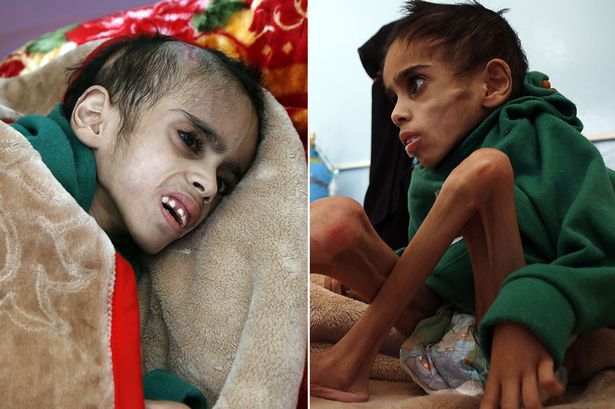A heartbreaking image of a starving seven-year-old boy weighing just 15lbs (7kg) exposes the cruel reality of the ‘forgotten’ Yemen war.
Faid Samim, paralysed and severely malnourished, is shown curled up on a hospital bed in the Yemeni capital Sanaa in the newly-released photo.
His family had to travel 105 miles through checkpoints and damaged roads to get him to the Al-Sabeen hospital, the Mirror reports.
“He was almost gone when he arrived but thank God we were able to do what was necessary and he started improving,” Rageh Mohammed, supervising doctor of hospital’s malnutrition ward, said.
“He is suffering from CP (cerebral palsy) and severe malnutrition.”
Unable to afford Faid’s medication or treatment, his family relies on donations to get him treated.
Dr Mohammed says malnutrition cases are on the rise and impoverished parents are forced to rely on the kindness of strangers or international aid to get their children treated.
Famine has never been officially declared in Yemen, where a six-year war has left 80% of the population reliant on aid in what the U.N. says is the world’s largest humanitarian crisis.
U.N. warnings in late 2018 of impending famine prompted an aid ramp-up, but now coronavirus restrictions, reduced remittances, locusts, floods and significant underfunding of the 2020 aid response are exacerbating hunger.
The war in Yemen, in which a Saudi-led coalition has been battling the Iranian-aligned Houthi movement since 2015, has killed more than 100,000 people and left the country divided, with the Houthis holding Sanaa and most major urban centres, Reuters reports.
A tragic timeline of the Yemen war
- In 2011, the Arab spring protests undermined then president Ali Abdullah Saleh’s rule.
- The uproar led to splits in the army and allowed al Qaeda in the Arabian Peninsula (AQAP) to seize swathes of territory in the east.
- In 2012, Saleh stepped down in a political transition plan backed by Gulf states.
- Abd-Rabbu Mansour Hadi became interim president and oversaw a “national dialogue” to draft a more inclusive, federal constitution.
- In 2013, AQAP survived military onslaught and drone strikes, staging attacks across the country while retaining a persistent presence.
- The following year saw the Houthis seize Sanaa, the capital of Yemen, with the help of Saleh.
- In 2015, Hadi tried to announce a new federal constitution opposed by the Houthis and Saleh, who arrested him.
- He escaped, pursued by the Houthis, triggering Saudi intervention in March along with a hastily assembled Arab military coalition.
- Months later, the coalition drove the Houthis and Saleh loyalists from Aden in south Yemen and Marib, northeast of Sanaa, but the front lines solidified, setting up years of stalemate.
- In 2016, hunger grew as the coalition imposed a partial blockade on Yemen, accusing Iran of smuggling missiles to the Houthis through Hodeidah alongside food imports – something it has denied.
- Coalition air strikes that killed civilians prompted warnings from rights groups, but Western support for the military campaign continued.
- In 2017, the Houthis launched missiles into Saudi Arabia.
- Seeing a chance to regain power for his family by withdrawing from his Houthi allies, Saleh switched sides, but was killed trying to escape them.
- In 2018, coalition-backed forces advanced up the Red Sea coast against the Houthis, aiming to take the port of Hodeidah, the last main entry point for supplies into north Yemen.
- In 2019 the conflict in Yemen showed no real signs of abating and civilians continued to bear the brunt of military hostilities and unlawful practices of state and non-state armed groups alike.
- By 2020, the war had killed more than 100,000 people.



